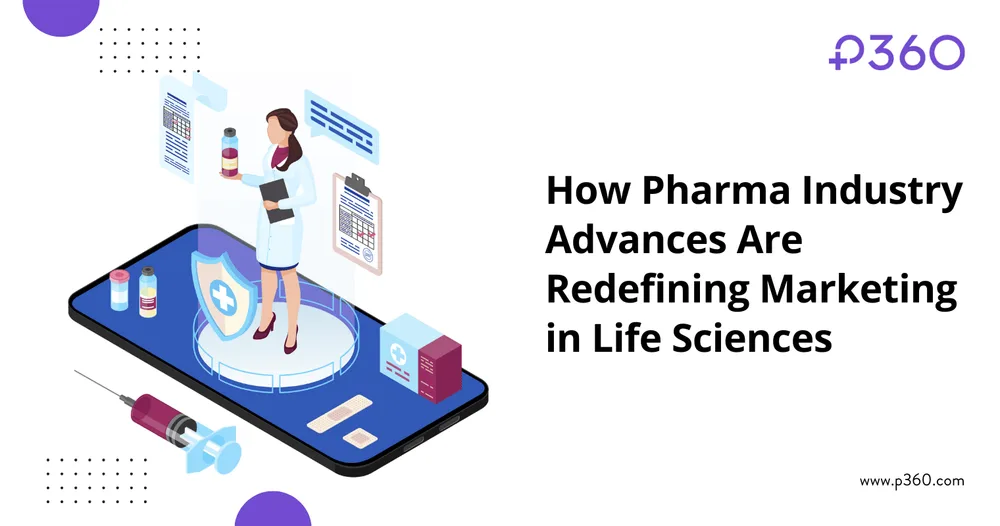How Pharma Industry Advances Are Redefining Marketing in Life Sciences

by Jacob Vazquez | Last Updated: July 9, 2025 | 1 min read
The pharma industry advances in recent years have pushed life sciences into a new era: an era defined by scientific innovation and digital transformation. From groundbreaking discoveries in AI in pharmaceutical R&D to the rise of 3D printed medications, the landscape has shifted dramatically. As these technologies continue to evolve, the way pharmaceutical companies communicate, educate, and market to healthcare professionals (HCPs) must also evolve.
Marketing strategies can no longer rely solely on traditional models. Instead, they must adapt to the digitalization of medicine trends, which now include virtual trials, telehealth, personalized treatments, and cloud-powered patient engagement. The tools used in the lab are influencing the tools used in the field. And that change is happening faster than ever before.
This wave of pharma industry advances has also introduced new challenges: ensuring compliance in omnichannel outreach, managing approved content across teams, and tailoring messaging to individual providers. These needs are real and urgent, and marketers are expected to stay ahead of the curve.
Technologies such as AI in pharmaceutical R&D are not only speeding up drug discovery but also enabling predictive insights that guide commercial strategies. Likewise, 3D printed medications are redefining personalization in treatment, requiring equally personalized marketing approaches. As digitalization of medicine trends become mainstream, scalable digital communication platforms have become essential for modern pharma marketing teams.
That’s where solutions like P360’s ZING Engagement Suite enter the picture. Designed for agility and compliance, ZING empowers life sciences brands to navigate this transformation with confidence.
In the sections that follow, we will explore how the latest pharma industry advances: AI, digitalization, and 3D printing, are rewriting the rules of marketing in the life sciences space.
AI in Pharmaceutical R&D Is Transforming Drug Discovery and Commercial Strategy

As pharma industry advances continue to accelerate, the role of AI in pharmaceutical R&D has grown significantly. Machine learning and data modeling are now being used to analyze vast clinical datasets, identify potential drug candidates, and predict trial outcomes faster than ever. This shift has not only improved discovery timelines but has also reduced R&D costs.
AI-driven systems are being applied to biomarker analysis, patient cohort identification, and real-world evidence mapping. These improvements have allowed new therapies to be brought to market with greater precision. In response, marketing leaders must rethink how they position and promote these innovations to HCPs and stakeholders.
Predictive Analytics in Pharma for Hyper-Personalized Marketing
With the help of AI in pharmaceutical R&D, pharma marketers now have access to deeper behavioral and engagement insights. These insights are used to create more relevant and personalized communication strategies. Segmentation based on clinical interest, prescription patterns, and even sentiment analysis is now possible with AI-enabled tools.
This evolution in marketing reflects the broader trend of digitalization of medicine trends across the healthcare ecosystem. Marketing content can be tested, adjusted, and delivered in real-time across multiple touchpoints, ensuring that the right message reaches the right HCP at the right moment.
In this context, pharma industry advances have not only changed the science but also the strategy. Marketing is no longer reactive, it is predictive and data-driven.
Explore More Relevant Articles on P360
- The Power of Dashboards with Machine Learning for Pharma
- P360/Swittons - Press Release - April 2020
- State Laws Seek to Regulate Sales Rep & Physician Interactions
- Power BI Insights for C-Suite from Microsoft MegaExpert Belinda Allen – Part 2
Real-Time HCP Engagement Through AI-Powered Communication Tools
Today’s commercial success relies heavily on rep-to-HCP engagement. AI tools now enable real-time recommendations, content delivery, and follow-up strategies, all optimized through ongoing data inputs. Sales teams using AI-powered tools are seeing improved engagement and better message recall among physicians.
Solutions like P360’s ZING Engagement Suite are supporting these efforts. With real-time interaction capabilities, approved content delivery, and integrated analytics, ZING makes AI-backed communication a reality. It aligns with current pharma industry advances and empowers reps to deliver more value during every interaction.
AI’s role in shaping the future of pharma is no longer hypothetical. Through platforms like ZING and innovations in AI in pharmaceutical R&D, life sciences companies are building smarter, faster, and more precise engagement models.
As the digitalization of medicine trends continue, marketing teams must stay agile. And with pharma industry advances becoming more complex, the need for adaptive, intelligent communication has never been greater.
Digitalization of Medicine Trends: The New Foundation of Pharma Marketing

As pharma industry advances reshape the life sciences sector, the digitalization of medicine trends has emerged as a defining force. From early-stage clinical trials to commercial distribution, nearly every stage of drug development and delivery has been touched by digital tools.
Cloud-based platforms are being widely adopted to manage trial data, track patient outcomes, and coordinate research teams across locations. These technologies have also simplified workflows for commercial teams, enabling the seamless deployment of content, insights, and compliance-approved messaging to field reps. With AI in pharmaceutical R&D driving much of this change, efficiency gains are now seen both in the lab and in the market.
eDetailing, Remote Sampling, and Virtual Care Are Becoming Standard
One of the most significant digitalization of medicine trends has been the shift toward virtual engagement. Telehealth, once considered a temporary solution, has become a standard method of care delivery. This trend has opened the door for eDetailing, virtual consultations, and remote sampling, all of which allow for faster and more flexible communication with healthcare professionals.
Marketing strategies are being adapted to reflect these new norms. Real-time tools for digital interactions have replaced printed materials and face-to-face visits in many instances. These changes reflect broader pharma industry advances, where innovation in engagement has become just as important as innovation in treatment.
Solutions like P360’s ZING Engagement Suite are helping teams navigate these transitions. ZING enables real-time content delivery, personalized messaging, and omnichannel outreach, aligned with regulatory standards and designed for scalability.
Ensuring Data Security and Compliance in a Digitally Regulated Landscape
With the rise of digitalization of medicine trends, new challenges around data protection and regulatory compliance have also surfaced. Maintaining trust with HCPs and patients requires strict adherence to data governance policies.
Platforms used for digital engagement must ensure that all communications are compliant, secure, and traceable. This requirement is critical in the life sciences, where misinformation and data breaches can have serious consequences. The alignment of AI in pharmaceutical R&D with secure digital platforms ensures that the entire value chain: from discovery to marketing, remains accountable.
In the context of broader pharma industry advances, maintaining a strong digital infrastructure is not optional; it’s a necessity. The ability to deliver consistent, compliant, and compelling messages through digital channels will define which companies lead and which fall behind.
As 3D printed medications and other next-gen treatments become more common, marketers will need tools that can adapt to these changes quickly. Platforms like ZING, which support flexible, real-time communication, are essential to success in this evolving digital landscape.
By embracing the digitalization of medicine trends, life sciences brands are not only modernizing their processes; they are preparing for the future of medicine itself.
3D Printed Medications and the Marketing Shift Toward Personalized Therapies

Recent pharma industry advances have brought forth a new frontier: 3D printed medications. These innovations are making personalized medicine a reality. Custom pill dosages, release profiles, and even drug combinations can now be printed layer by layer to meet the unique needs of each patient.
With this level of personalization, marketing strategies must also evolve. Life science brands are being expected to communicate complex treatment models in simpler, more digestible ways. Personalized medication requires personalized messaging, delivered through channels that align with modern digitalization of medicine trends.
3D Printing’s Disruption of Pharma Supply Chains and Patient Education
As 3D printed medications become more widely adopted, the traditional pharmaceutical supply chain is being reimagined. Medications may no longer be mass-produced in a central location. Instead, on-demand drug printing could take place at local hospitals or specialty pharmacies.
This shift presents an opportunity for marketing teams to position their companies as leaders in innovation. Educational campaigns will be needed to explain how pharma industry advances in printing technology support faster, safer, and more sustainable drug delivery. These campaigns must address healthcare providers, supply chain partners, and patients alike.
According to insights shared, these “next-gen delivery systems” will also rely heavily on digital communication tools. Cloud-based platforms like ZING will be key to ensuring that educational content is distributed efficiently and compliantly.
Building HCP Trust Through Omnichannel Campaigns for Printed Medications
Because 3D printed medications represent a significant change in how therapies are developed and delivered, building awareness among healthcare professionals is critical. Marketers must focus on trust-building, highlighting clinical efficacy, regulatory approval, and real-world benefits.
This shift will require an omnichannel approach that includes webinars, eDetailing, AI-powered rep interactions, and personalized emails; all supported by platforms like ZING. These tools can deliver content approved for compliance while adapting to the preferences of each HCP.
The combination of pharma industry advances, 3D printed medications, and the ongoing digitalization of medicine trends is redefining the expectations placed on pharma marketing teams. A new layer of precision is being demanded, and only those equipped with adaptive strategies will stay competitive.
As the future of treatment is printed, so must the strategy behind its promotion be redefined layer by layer, message by message.
How P360’s ZING Platform Supports Pharma Industry Advances with Scalable Marketing

As pharma industry advances accelerate, the demand for agile, compliant marketing platforms has increased. ZING, developed by P360, has been designed to meet this demand. It uses the power of AI in pharmaceutical R&D to improve the way life sciences companies engage with healthcare professionals (HCPs).
By analyzing engagement patterns, ZING helps reps deliver more targeted messages. Real-time suggestions and approved content can be shared instantly, reducing the need for manual follow-up. This has created a seamless way to connect innovation in the lab to communication in the field.
Achieving Compliance and Efficiency Through Digital-First HCP Engagement
The shift toward digitalization of medicine trends has changed how information is shared in pharma. ZING supports this shift by offering tools like QR code integration, eConsent workflows, and digital form submissions. These features allow field reps to operate digitally, while ensuring all interactions remain compliant with regulatory standards.
Approved content can be delivered with precision, helping teams stay within promotional guidelines. For companies focused on pharma industry advances, ZING provides a framework that balances speed, control, and consistency across the entire sales cycle.
Deploying Personalized Messaging Across Territories Using ZING Automation
As 3D printed medications and other personalized treatments grow in adoption, the need for localized and relevant messaging has increased. ZING addresses this by allowing marketing teams to deploy territory-level strategies with ease.
Messages can be tailored based on physician preferences, therapeutic areas, or geographic nuances. AI tools within ZING ensure that engagement remains timely and contextual, strengthening the connection between reps and providers.
Through smart automation, deep analytics, and integration with the broader life sciences ecosystem, ZING has positioned itself as an essential platform for navigating pharma industry advances. Its support for AI in pharmaceutical R&D, digitalization of medicine trends, and future innovations like 3D printed medications makes it a vital asset for forward-thinking pharma teams.
Conclusion – Embracing Pharma Industry Advances to Future-Proof Marketing

The pace of pharma industry advances has transformed how life sciences companies approach marketing. Breakthroughs in AI in pharmaceutical R&D, the continued rise of digitalization of medicine trends, and the emergence of 3D printed medications have reshaped not only product development, but also how those products are introduced to the market.
Marketing teams are now being asked to do more than promotion. They are expected to educate, personalize, and engage with all whiles staying compliant and agile. These expectations can only be met by embracing intelligent tools and modern infrastructure that support real-time, data-driven strategies.
As the pharma industry advances become more complex, the need for adaptable communication becomes more urgent. AI is already being used to analyze HCP behavior, tailor messaging, and track performance. Innovations in 3D printed medications create new layers of personalization in both treatment and engagement. The digitalization of medicine trends is moving faster than ever, making it critical to keep pace with how providers consume and respond to information.
To stay competitive, life sciences marketers must act now. Platforms like P360’s ZING Engagement Suite have been built to meet the demands of this evolving landscape. ZING supports compliant content delivery, real-time HCP interaction, and campaign-level agility across regions and therapeutic areas.
The future of pharma belongs to those who can align strategy with innovation. By adapting to pharma industry advances and adopting solutions that support AI in pharmaceutical R&D, digitalization of medicine trends, and 3D printed medications, teams will be better prepared to thrive in this next era of marketing.
Now is the time to move forward, with purpose, precision, and the right tools.